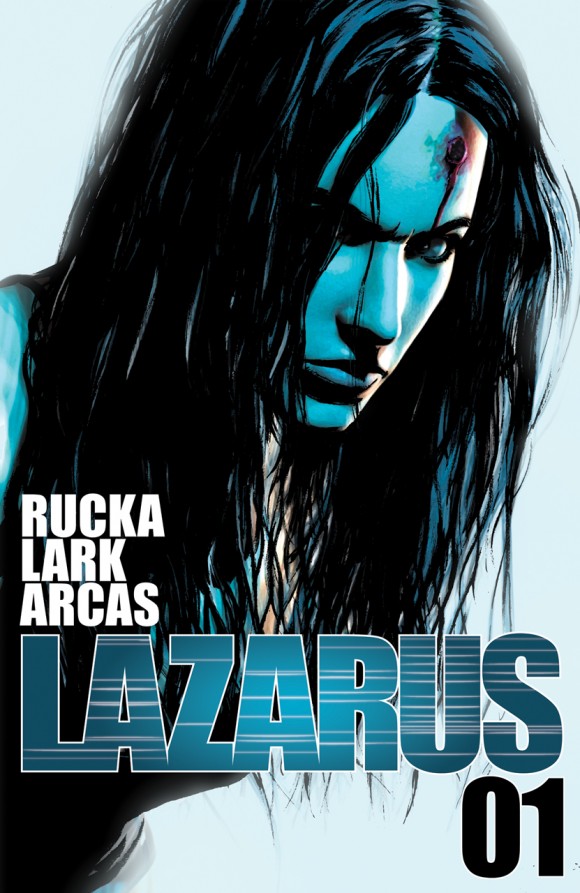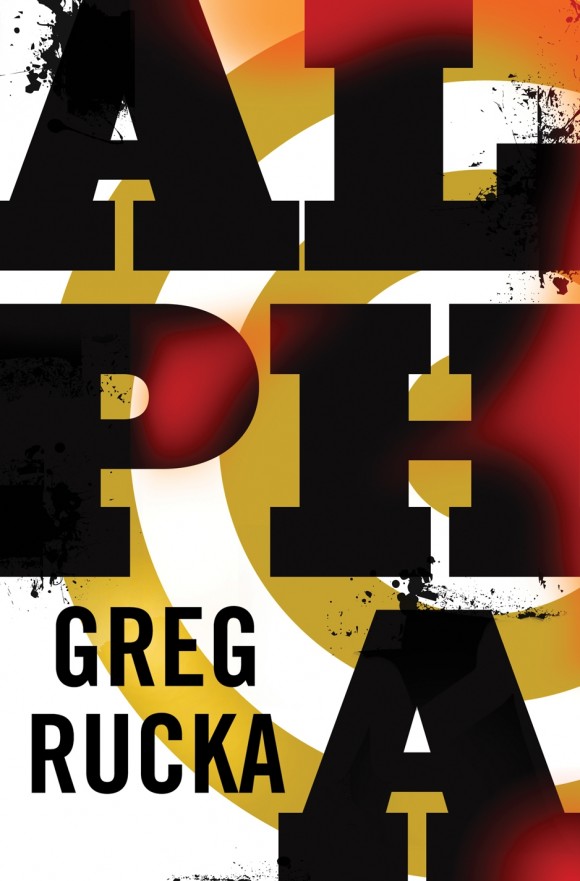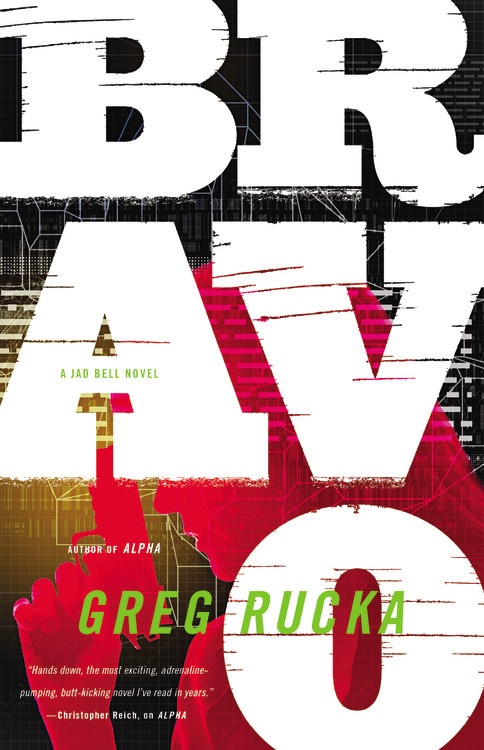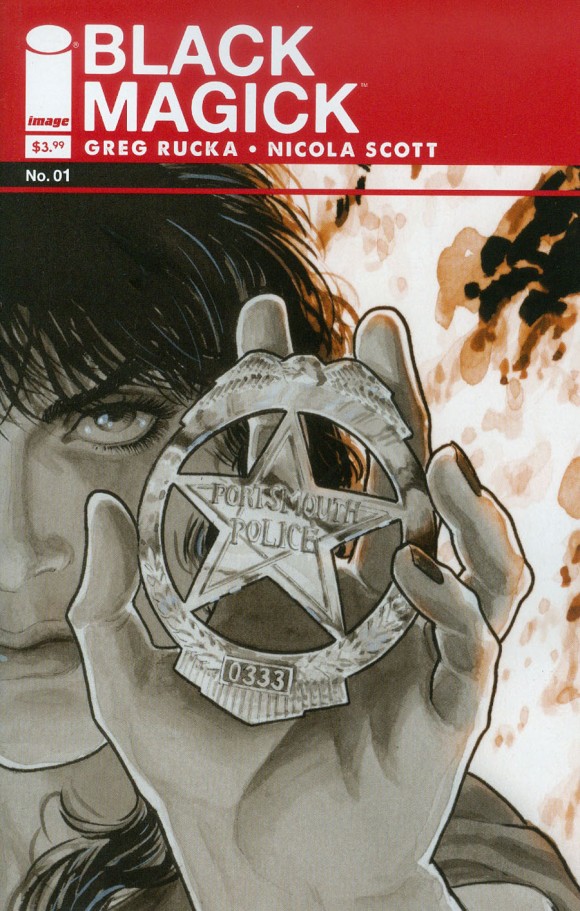The first in a recurring series of talks with one of comics’ top writers …
—
PART 1 of 3: Comic master and novelist Greg Rucka came to town for New York Comic Con and sat down with G.D. Kennedy over breakfast to talk about his current comics, like Lazarus, Star Wars: Shattered Empire and Black Magic — and his novels.
By G.D. KENNEDY
On the Friday of New York Comic Con, I pulled myself together and wandered down to Friedman’s, a breakfast and lunch spot which appeared in the neighborhood in the last year, a part of the Midtown West’s evolution from aging warehouses to glass high-rises and designer restaurants. I’m on my way to Friedman’s for breakfast with Greg Rucka, who is in town for NYCC, to do signings for Image and Dark Horse and Oni, and also to talk about Star Wars: Shattered Empire, which represents Rucka’s contribution to the vast literary and cinematic Star Wars universe being developed by Marvel and Disney.
Suffice it to say, Mr. Rucka is a busy man; he simultaneously publishing books with almost every major publisher while keeping up his career as a novelist — he has dozens of books to his name — and also perfecting the script of the pilot for the television adaptation of Lazarus, his ongoing title from Image.
When I show up at 9:00 a.m. on the dot, Greg is already seated at a small table, a dark skull cap on his head, earphones plugged into his pierced ears, hunched over a notepad that is resting on the table. Greg is immediately friendly and loquacious, incredibly thoughtful in response to each question posed, offering a mixture of impeccable clarity and detail, always speaking with a measured precision. It is unmistakable that Greg is a writer.
Greg is also incredibly passionate about his work. You can tell how invested he is in everything that he does. With Lazarus, Greg can talk for hours about the book and the political theory behind it and the relation to modern social dynamics, while he becomes immediately giddy about the fact that he is working on a Star Wars book, that he is in fact actively affecting the life and times of Hans Solo.
We spent the next couple hours eating breakfast — Greg passes on pastrami hash at the threat of too many potatoes, settling for a pastrami omelette instead — at a local park, and strolling the show floor of NYCC, covering Greg’s current comic work, as well as his literary endeavors and his love for Mark Knopfler.
Below is the Part 1 of 3 of the interview, in which Greg talks about working as a novelist. More to come soon!
***
G.D. Kennedy: Were you listening to anything good when I came in?
Greg Rucka: I’ve been listening to a lot of [Mark] Knopfler. A lot of Knopfler. I’m an old Dire Straits fan, I’m a huge Knopfler fan. I think a lot of his solo work is fantastic. Finally got to see him in concert. I got back from Australia about 10 days ago and just before we left, I think the third stop of the current North American tour was Portland, and I actually took the kids and we all went, because the poor kids have been — they’ve grown up with him. My son, actually, is 15, and really into music, and quite intelligently so. He’s starting to study it.
G.D.: Is he a musician himself?
Greg: No, he’s a dancer, actually. He Got into hip hop and rap and he started really educating himself and he reads pretty widely, and has sort of blossomed. So it was sort of awesome to sit there with him and be like — you know, it’s a mixed crowd, it’s a bunch of old farts like me, and there’s nothing more embarrassing than going to a concert and realizing that half of this audience is closer than 50 to 20, and [Knopfler] did a lot his new stuff and he hit three or four of his old song, and they did “Sultans [of Swing].” And at “Sultans,” the whole place just goes crazy.
G.D.: And it’s him solo at this point, without the rest of the Dire Straits?
Greg: Guy [Fletcher] is still with him, because Guy has been producing him forever, and Guy’s in the band. And there’s seven of them in the band, and five of them are playing strings. It really is incredible, and the new album, Tracker, is really good. I think it’s the best one since Sailing to Philadelphia, so anyway — I can go on about Knopfler for hours. I have a lot of respect for that crowd.
And like I said, he set up Sultans, and I turned to my son and said, “You’re about to witness live one of the greatest guitar solos in history.” He hit a lot of songs that were favorites of the kids, so that was cool, because my daughter is twelve and, you’d see her being like, “Ehhhh,” and then he hit a couple songs, and she’d be like, “Oh my god, he’s playing ‘Paraguay,'” which is stuff that she really likes.
G.D.: Was this their first show?
Greg: No. My son at fifteen has been to more concerts than I’ve been to in my entire life, and my daughter is rapidly closing in. We had a good time.
I’ve got the new novel in preliminary on, and a lot of it is — I tend to associate songs with what I’m writing.
G.D.: What’s the new novel?
Greg: I have no idea when it will be out, but it’s called In the Eyes, which is the working title. It’s from Mulholland [Books], and it will be the last book I do under this contract.
G.D.: Is it one of the Atticus novels?
Greg: No. I went to Mulholland and I did two books, Alpha and Bravo, which was a new series with a new character, a new lead, and Bravo came out at a really bad time. My publisher is Mulholland, but Mulholland is part of Hachette, and the book came out when Hachette and Amazon were fighting, and it also came out about when my dad died, so there was just no support for the book on anybody’s part. And then my publisher turned around and said, “Didn’t really sell well. Try something different.” And there was a piece of me that said, “Or you guys could have actually backed the play.” So they asked for something different, so I said, “You know what, gloves are off.”
Everytime — you know, in comics, especially creator owned comics, I write what I want to write. Novels, I’ve always been I think far too accommodating to my publishing and my editor, and I think it’s hurt me. I think it’s really hurt me.
G.D.: Is there a reason that you have a different approach between the two mediums?
Greg: Maybe. I came to novels first when I was very young, and my first editor had a very — I had no idea what the relationship with an editor should be like, so her dysfunctional relationship with me seemed perfectly normal. it was only much later that I realized nobody else has an editorial relationship like this. I mean, nobody. They have editors who talk to them. She wouldn’t talk to me. She’d send me off, I’d write a book, I’d send it to her, I’d get editorial letters — literally, a typed letter saying, “This is what I think.” There might be a phone call after the letter — one. I might do a revision and I’d send it in, and it would either be approved, or I’d get another editorial letter and we would repeat.
G.D.: That sounds impersonal and inefficient.
Greg: And pretty isolating. One of the things that you get in comics, and one of the things that I’m very bullish about in comics — I was talking to David Brothers at the Image booth yesterday, and I adore him. I think he’s probably one of the smartest guys I know, and I like smart people, so I try to know a lot of them, and I think he’s just blazingly smart, but he’s a brilliant fucking editor. Him and James Lucas Jones, amazing editors. Mike Seblaine, who took over on New 52 when [Stephen] Wacker got pushed over to Marvel, and then went to Disney and now heads up the Lucasfilm publishing initiative, is the guy who brought me in on all the Star Wars stuff, another one who is just fabulous.
The problem is I can count the number of really good editors on one, maybe two hands. I can count the number of horrible editors one, maybe two hands. There are countless mediocre editors. So I guess in comics, the editorial relationship needs to be ever the more present, because there are so many moving parts. I’m working with Jeanine Schaefer on Black Magick and Jeanine’s just fabulous. She’s just incredible. She’s on top of everything, she’s smart, she chases stuff down. And I think part of it is due to workload. If you edit at Marvel or DC, you’ve got 10, 15, 20 books. And at Image, there’s so many less, so you can actually track everything and be involved.
So I’m inclined to give this editor way back when in publishing the benefit of the doubt. She was used to doing it in a certain way. She was very established. But when I finally left that publisher and finally ended up going to Mulholland, the first editor to have brought me in left. He got a Hollywood job and went off to join that, so I became an inherited project for the new editor, which is always awkward. And it’s awkward for him, because he’s got to decide, and a bad editor will do what a TV producer does, which is, “You’re the last guys project and I’m killing it,” because god forbid there be a success on the last guys thing. My new editor, god bless him, has put his back into it, but we don’t really know each other, and there’s not been a lot of communication.
And like I said, this stuff comes after my dad passed, and I was just like, “I ain’t writing anything.” But I have reached a place where I have found the novels are very painful, they are very hard to write, they take an inordinate amount of time. To be a very effective novelist in this market, you have to really machine gun these things out. To do that well requires a time and a discipline. I have the discipline, but I don’t have the time. Chuck Wendig, who I admire a great deal. Adam Christopher, another one of these “new,” writers, and I say “new,” quote unquote, they’re not new, they paid their dues. You’re going to get a book, or multiple books from them, each year; from me at my best, you get one maybe every two years, and that’s just not enough in this market with all the readership. That said, I’ve written at this point 26 books, and this will be 27. It has been excruciating, and I think if I’m really honest and I do a little self analysis, the specter of my dad is really very present on this.
G.D.: Did your dad pass recently?
Greg: He passed last summer. He was sick for a while, but when he declined, he declined very rapidly. And — it was fortunate in that we didn’t leave things unsaid, fortunate in that we had a very positive relationship, and I have friends who can’t say the same about their fathers who they’ve lost. But it is still with me, and is with me in some ways that I didn’t anticipate. So — I’m not sure how I got on this.
G.D.: The bearing on the new novel, I think.
Greg: Yeah, so the new novel is due soon. I suspect that I will be informing my agent that he will be informing the publisher that they’re going to get the book when they’re going to get it. This is going to be the last one for a while, and I want it to be the book I want it to be. I don’t want to sit down and write it as fast as I can.
G.D: What is the book about?
Greg: It is about a woman who wakes up one day to find she has a snake in her hair.
G.D.: A snake in her hair, or growing from her head?
Greg: There is a question as to whether or not she is crazy. So this is, quote unquote, a departure for me. The way I pitched it to the editor was, it’s like [Jim] Thompson’s The Killer Inside Me, except less. It’s first person, and it’s about anger and rage. I’m looking forward to it, I’m excited about it. There’s nothing worse than sitting down to write a book and being like, “I am not in love with this idea,” because then you will find yourself without a book, or with a car crash. But this one I have high hopes for. I want it to be the book I want it to be.
What actually got us started, to bring it all the way back around, an editor would say, “This would be better for the market,” and I would say, “Okay.” And in comics I never do that, as is evidenced by my sales. But in novels I would do that and it doesn’t matter. In this one, it is like, “Everybody, I am going to write the book I want to write.” And at the end of the day, the publisher can be like, “We like this and will publish it,” or like, “We don’t like it,” in which case we’ll burn that bridge when we get there.
If it’s good, and I will say this about the people I’ve worked with at Mulholland, they want a good book. If I can deliver a good book, it could be a good book about two dust bunnies who meet by chance on a subway, and they would be like, “OK.”
G.D.: You were saying music has been playing a role in your thought process.
Greg: Just some songs I’ve been listening to, and I was like, there’s an element, there’s something in that I want to use. My literary agent is a guy named David Hale Smith, who is a very good friend of mine, and I’ve talked about this and I’ve seen it said in print in a couple places, and he’s said, if you’re talking about the story, it means you don’t want to write it, and when I talk about the story, it means I’m trying to work it out. I want to write it. Which goes back to the editorial issue, I want to have somebody who will listen to me and check me on the bullshit, and say, “I follow” or whatnot. But I need to articulate it. The idea doesn’t become real until I can get it out of myself or speak it, and as I speak it, things come together.
So I’ve been talking to David, and there are one or two songs I’ve been listening to — I really like this narrative in this song, there’s this element I want in this story — so there’s an element in the novel that takes place in Hollywood, obviously actor, actress, movie star, that kind of thing, but I don’t want to do an inside baseball book. There are beats of that, but it’s as much about how she got there and what she’s left behind, and the people that she’s left behind. And, you know, I’ve been around that machine and that apparatus long enough at this point to have experienced a few stories, and to have heard 50 more, and to have seen how that culture is really so toxic, and dangerous, and that there are not many who can survive — never mind celebrities — who can survive the gross egoism of that level of the entertainment industry without it taking a toll.
You know, when everybody is driving Land Rovers, then the Land Rover becomes everybody’s car. When every time you walk into a meeting, there are two people telling you how brilliant you are and how much they love you, and there is a third person who is saying, “Would you like a latte?”, you’re going to get used to people telling you that you are beautiful and bringing you a latte. And I don’t think — you add to all of that, in almost any popular art, there has to be an element of arrogance at work. There has to be in that I’m writing things that I think people should read.
Because if I didn’t think people should read it, then I wouldn’t bother trying to get it published. I had a teacher in college who asked in the first day of class, “Why write?” Everybody in the class was like, “Oh, I feel I have something to say about the world,” and “It helps me articulate these ideas,” all the liberal arts bullshit answers you expect that you will get. He let us go for about 15 minutes and then said, “Why should I read it?” You know, everybody is talking about what it means to you, but if you’re going to put it out there, you’re putting it out there because you believe you have a story or an idea to share, and I’m all for entertainment and I’m all for popular entertainment, but I think popular entertainment is entirely hollow if it isn’t saying something, and I think the result of that is that — as I am a liberal arts major — we are all saying something, whether we know it or acknowledge it or not.
G.D.: Right. Every action is a statement unto itself.
Greg: You got it. There are these two guys, David Walker and Robert Mackenzie who write at NerdSpan, and since issue one of Lazarus, they’ve been putting out with every issue 3,000 to 5,000 word essays that are these very close reads of the issues. These guys are very smart guys, they’re scary smart, they’re guys who when, I finally got to meet them in person, I was a little like, “I better be able to hold my ground.” And you know, [Michael] Lark will read this, and he’s called me more than once and said, “I have no idea where they’re getting this from. I didn’t put any of this in there.” And I say, “Well, you did if they’re finding it.” If it’s in the text, if they can find it, it’s there.
It’s very rare that I’ve seen analyses where I’ve thought, “You’re manufacturing,” that this isn’t in the text and you’ve created a thing to fit your argument. For the most part, people doing lit crit, if they’re seeing it, it’s because it’s there.
G.D: It reminds me of a comment from my own teacher about why writers put symbolism in. Writers don’t. People find the symbolism afterwards.
Greg: Or we do but the symbolism is so gross and obvious that nobody sees it.
G.D.: Everybody ignores that top layer —
Greg: Exactly. Every single time I’ve gone into it, any time I’ve ever gone and cried that I want to put something in, or I’ve actively tried to use something as a symbol, every single time, every single time, it’s been missed. And it’s either missed because it’s too subtle for my own good, or it’s too overt and everybody’s like, “Yeah, yeah, we got that.”
G.D.: It comes across a little hacky.
Greg: Yeah, yeah. “It’s of no interest to us whatsoever. Carry on.” And I suspect it’s the latter and not the former.
The interview will continue shortly with Part 2, in which we talk Lazarus until my tape recorder cuts out (and then we start talking again).






Trackbacks/Pingbacks